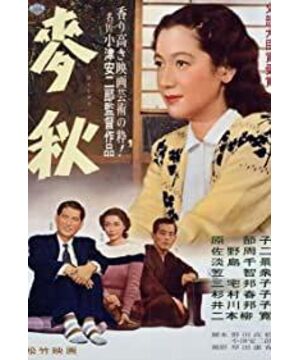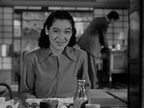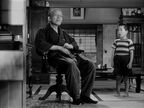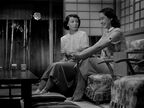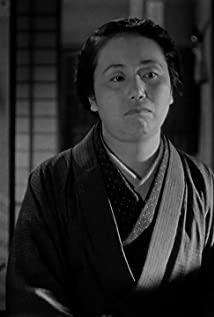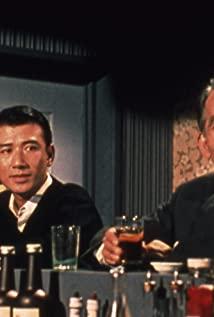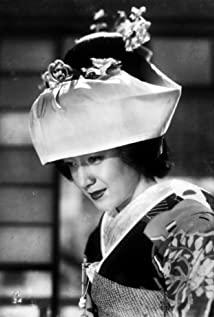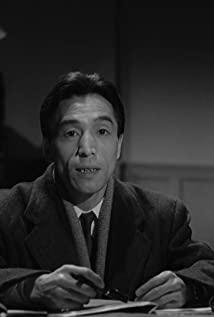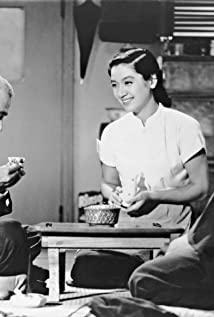In Ozu's life, "North Kamakura" was a key word, which accommodated his peace of life and death; in the film "Mai Qiu", "North Kamakura" was also a key word, and the story happened in in this quiet town. So, what kind of place is Kita Kamakura? An online search got this introduction:
"Kamakura City is located in the southeastern part of Kanagawa Prefecture, surrounded by mountains on three sides and facing the sea. It used to be a natural fortress. The history of Kamakura can be traced back. By 1192, the then military commander, Gen Yoritomo, led the samurai group in the Kanto region and established the political center, the shogunate. Kamakura, with a history of about 800 years, is full of tourist attractions represented by temples and shrines. Visitors can Learn about the history of Japan. The starting point for roaming Kamakura is North Kamakura.
At the end of the Kamakura period, the "Kamakura Five Mountains" established by the then-authorized Hojo clan was a system for classifying Zen temples. According to this system, it is divided into the first Kencho-ji Temple is the No. 1, Engaku-ji Temple is No. 2, and Jochi-ji Temple is No. 4. The temples with a long history and high level are concentrated in Kita Kamakura. You can visit the history while enjoying a forest bath.
In addition, You can go to shrines and temples to see various seasonal flowers, such as the hydrangea in Meigetsu-in, the plum and iris flowers in Tokei Temple, and the cherry blossoms in Kencho-ji Temple, which are all very famous.
Take the JR Yokosuka Line from Tokyo Station to the north About 50 minutes from Kamakura Station."
This is the ideal place for Ozu's story. The purely tourist guide-style introduction made my mind outline the daily life environment of the characters in the film, the scenes they see every day when they commute to get off work, and I also understand why trains appear frequently in Ozu's films. , "Idle pen" is not idle.
Compared with other simple films of Ozu's family members and no more than two generations, this movie can be described as three generations in the same family and many characters. Mamiya is the eldest son of the family. He has parents and two children, and his sister Noriko lives with them. Such a big family, old and young, enjoying themselves together, is busy every morning, going to work, going to school, still saying good morning here, and saying goodbye there. The off-screen music is Ozu's favorite "Lovely Home". This time, the ding-dong sound from a wind-up music box is used to set off the picture like a dream.
It is such an "ideal family", where the father is filial to the son, the husband and wife are harmonious, the aunt and the sister-in-law are harmonious, and the children are well-behaved, but there are still troubles. The family's heart knot is the marriage of his sister Noriko. Twenty-eight years old and still not moving, not to mention that his family is anxious, the neighbors are also talking about it.
The actor of Noriko is Hara Setsuko, the eternal woman of Ozu film, and even the image incarnation of the eternal woman of Japanese film. Setsuko Hara's "ritualized" beauty is a special case in film history. Under her eternal expression, all the words that measure the quality of her acting skills have become nonsense. You can't say her acting skills are good or bad. , she doesn't belong to the "department" of acting at all. She is a symbol, an ideal hope, a trance of memories, and she builds a bridge between reality and reality with a sincere and generous smile. She's never overbearing, but she's not specific. She is very vivid, like any beautiful woman around us who makes you feel physically and mentally happy; but she is very flat, like the person in the painting, which only exists in a space that you can see and touch.
The afternoon sun shone into the house, so bright and warm, his eyelids couldn't help but heaviness, he took a nap, suddenly jolted, hugged his body tightly and looked around in confusion, and the room became overcast again. Setsuko Hara shines on the screen like the sun, and then quietly retreats, as if it never existed. But the darkened room has the breath of sunshine; the cold body has the sun's hickey.
People are generally obsessed with the smile frozen on the film. They say that her smile is sweet, gentle and beautiful. I don’t know why, but I always read a trace of sadness and bitterness from her eyebrows, even when she is laughing. Feeling the absent-minded caress gliding across her brows, she really is not a beauty in reality, her beauty cannot be found in the world.
With such a Hara Setsuko playing her younger sister Noriko, she is the perfect woman—except for being a little older. "I can't do it, I can't do it." This is the only reason for my aunt to be alone. On the surface, Kiko is easy-going and docile, but she is actually quite assertive. When I saw the joke between a competent secretary and a kind boss in the office, I thought I was about to encounter another O. Henry-esque story. My guess failed, and I guessed that Noriko's own ignorant wish also failed, and the boss opened her mouth to introduce her to the object.
This kind of "prelude to blind date" that frequently appears in Ozu's films is particularly interesting. There are only a few words, nothing more than graduation school, family background, and one's own career. The listeners all said sincerely: "It seems that he is a good person who has a future and can rely on! "
This kind of "social conjecture" is tantamount to another kind of prejudice. How can it not make people think of the famous opening of "Pride and Prejudice": "Every single man who has an estate must marry a wife. This has become a universally recognized rule. The truth of such a bachelor, every time he moves to a new place, although the neighbors have no idea of his temperament and opinions, but since such a truth has long been ingrained in people's minds, people always regard him as As a fortune that one of my daughters deserves."
An equally "perfect" man was like a stone, smashing into the pond where the Noriko family lived peacefully, causing ripples.
The various depictions in Ozu's films are quite Austen-like: the Bennet sisters only saw Mr. Bingley from the window in a blue coat and riding a black horse, and concluded that he was handsome; photos of the golf course, it is concluded that this person is honest and reliable. Both sides launched a "spy war" in order to obtain more information and improve the odds of winning in this marriage gamble. Needless to say on Mamiya's side, Yukiko's friend Ayako's gossip mother took the initiative to report various situations, and her doctor colleagues made inquiries; the other side was even more powerful, and even dispatched a private detective.
After inquiring and inquiring, everything is satisfactory. The only thing that is in the ointment is the man's age - from this point of view, he and Noriko are really "worthy", even the "defects" are the same - a man who is still single at the age of forty, Will not have any problems. This new situation has discouraged the energetic family, especially the mother, who is a little unwilling to marry her daughter in the Mood for Love to a middle-aged man. But the eldest son, Jian Gong, made up his mind, and blamed his mother for being too greedy. Such accusations make the elderly mother feel sad. What kind of marriage will make the parents completely satisfied? It probably doesn't exist in this world. Children raised like pearls and treasures are always the best in the eyes of their parents. Anyone who gets married (married) is inevitably picky, suspicious, and wronged.
The family atmosphere suddenly became heavy, and the adults sat in the corner with their own thoughts. The children are ignorant. Brothers Xiaoshi and Xiaoyong are angry that they mistook the long bread bought by their father for the little train they have been looking forward to for a long time. The abyss of disappointment, this kind of pain is difficult for the child's young mind to dispel no matter what, so the brothers are unrepentant and ignorant of practicality. Seeing this, I can't help but smile knowingly. Those long-standing "puzzles" buried deep in my memory have finally found the answer: that's how the disaster of innocence was brought about, my childhood full of grievances!
Like the brothers in "Good Morning", the brothers in "Mai Qiu" also ran away from home. At this time, my sister's submerged thoughts surfaced. In a pinch, the person you go to subconsciously may be the person you think is the most important in your heart. Therefore, life has to change and even change, otherwise, a calm person like my sister, a gentle person like Qianji who came to look for her, will never try to get on the head and get on the line for the rest of her life. Kenji is not a new character who suddenly appeared. He is a middle school classmate of Noriko's second brother who disappeared during the war, a hospital colleague of his elder brother Mamiya, and an old neighbor of the family. fellow travelers at work. He was actually like another brother of Noriko. Noriko later defined her mood changes as-accidental: this person has always been by his side and is accustomed to it. Accidentally raised his head, his heart moved, he was different. . .
Knowing the root, the family background is innocent, and the future is promising. Such a person is supposed to be the ideal candidate for a quick son-in-law. Why is the Mamiya family turning a blind eye? Once again, it proves the sharp opposition between perfect expectations and incomplete reality: the "perfect" Kenji is a widower, dragging a young daughter with an old mother. This alone is enough to disqualify him as a "perfect" candidate, and no one (including himself) has any thoughts on him.
The child's runaway incident was successfully resolved, and then Kenji was sent to work in the Akita countryside by the hospital for a few years. Noriko's originally chaotic heart gradually became clear. On the other side, the "humble" is Kenji himself. His mother has long been in love with Noriko, and "bold assumptions" in her heart, and "carefully verify" when Noriko is saying goodbye. It is Ozu's forte that there is a light wave in the calm, and calmly solves it. It is Ozu's forte. Noriko and Kenji's mother hit it off like this. There is a promise of ah ah ah, how did it happen! It's subtle and interesting.
Another stone smashed into the pond, possibly bigger than the previous one, with an awe-inspiring awe-inspiring aura. That's why I said that Noriko, who is always smiling, is actually very assertive. Not only did she take the initiative to break through the deadlock, but she also informed her family immediately after she came back, without hesitation, timidity, or embarrassment. The most angry is naturally the eldest brother Mamiya, who has been worrying about it all the time, and the most lost is the mother who cherishes her daughter. The water will always return to calm, and no matter how big the storm will be, it will subside. Noriko is so determined, the family has to let her go.
The family regained its former serenity, and the separable melancholy and unfulfilled loss cast shadows on Lang Zhao's sunshine. The music box ding ding dong dong played "Lovely Home" again, and the pure and childlike notes sounded a bit lonely.
Two of my favorite episodes in this film are both about the elderly at home. One is that in the middle of the film, Kiko's friends are going to visit on Sunday, Xiao Shi and Xiao Yong's friends come to play at home again, and the adults all go out to hide. The old couple were sitting by the roadside flower beds, chatting while eating. A kite with a broken string in the sky caught their attention. The father said, "The kite-flying child must be crying." The mother replied, "Yes. Ah, that's how Mamiya was when he was a child." In two simple sentences, like a sketch, he explained that the children left one after another when they grew up, and the parents' fate and sparseness.
The other is that after the family disputes subsided, everyone accepted the reality of Kiko's independent choice, but they couldn't help but sigh. The elderly father has never made a clear statement. He always repeats the words of his wife and eldest son, pondering and hesitating. On this day, I took a complete family photo at home. My father went out shopping alone. When a train passed by the railway, I sat on the side of the road and waited. . Following his line of sight, there were scales and clouds in the sky, full of words, and Ozu's camera stayed like this for a long time.
There are still a lot of lingering voices in the film, but Ozu chose to put it down calmly. For example, Noriko's dark emotional world, her family doesn't know it, and her friend Ayako doesn't notice it. Offscreen, I seem to have uncovered a mystery: in Ayako's small hotel, as soon as I heard that my boss was coming, Noriko immediately asked Going up to meet can be interpreted as enthusiasm for work (because she is indeed going up to report work), and it can also be interpreted as enthusiasm for people. Unexpectedly, the boss introduced her to the target directly, and Noriko's face darkened slightly under the light, which was a bit distressing. You could say I was chasing the wind, but then Noriko looked around and said what did it mean? It was clearly a woman whose mind was being beaten and forced to calm down. Noriko's assertive and unimaginative personality conceals everything very well. The vortex at the bottom of the water swirls gently, again and again, and the water surface is as smooth as a mirror. This is the best ending of a hopeless unrequited love. In the end, Kiko, who was about to leave for Akita, went to the company to resign. The boss teased, "What if it was me, a younger single person?" Kiko smiled but didn't answer. This joking boss, do you really not understand or are you pretending to be confused? You probably prefer Ayako, who can joke with you, so be clear, learn from Noriko, don't play games that tug at girls' heartstrings all day long, if it's not the always demure Setsuko, if It's not Ozu, who is always indifferent, in other movies, you are in big trouble!
Noriko is married, the old house in North Kamakura is to be renovated, and the old parents live in the uncle's house in the countryside of Yamato, and the family is separated like this. At the end of the film, it is autumn, and the wheat ears bowed their heads heavily. The old couple sat idle in the house. Looking from a distance, a line of greetings was slowly marching in the fields:
Mother: Where will you marry?
Father: Yes!
Mother: Noriko does not know what happened.
Father: Although everyone is scattered, we are still a happy family.
Mother: After a lot of things, a long period of time, I have been living a very ordinary life. . .
Father: But I lived happily.
I like this ending. Read the eyes of the world, watch Mai Lang, watch life, and life, how can there be happy moments.
[Note] There is a small flaw in this movie: Grandpa sat in the room with his great-uncle and admired the paintings. When the camera turned, behind Kiko who brought tea in, the place where the paintings were hung was empty, and the cabinet next to it was moved. I was surprised to see such obvious inconsistencies in Ozu's film, which is known for its rigor. I read this scene several times, and finally decided to explain it this way: The painting is hung on the sliding door that is common in Japanese-style houses. Two elderly people It should be put away after viewing the paintings, and the sliding door has also been pushed to the corner, which looks like the cabinet has moved. Is this explanation "reasonable"? Maybe this is the truth - people are always extra tolerant and even connivance towards their loved ones, how can I be an exception.
View more about Early Summer reviews


